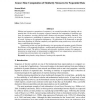Free Online Productivity Tools
i2Speak
i2Symbol
i2OCR
iTex2Img
iWeb2Print
iWeb2Shot
i2Type
iPdf2Split
iPdf2Merge
i2Bopomofo
i2Arabic
i2Style
i2Image
i2PDF
iLatex2Rtf
Sci2ools
151
click to vote
JMLR
2008
2008
Linear-Time Computation of Similarity Measures for Sequential Data
Efficient and expressive comparison of sequences is an essential procedure for learning with sequential data. In this article we propose a generic framework for computation of similarity measures for sequences, covering various kernel, distance and non-metric similarity functions. The basis for comparison is embedding of sequences using a formal language, such as a set of natural words, k-grams or all contiguous subsequences. As realizations of the framework we provide linear-time algorithms of different complexity and capabilities using sorted arrays, tries and suffix trees as underlying data structures. Experiments on data sets from bioinformatics, text processing and computer security illustrate the efficiency of the proposed algorithms--enabling peak performances of up to 106 pairwise comparisons per second. The utility of distances and non-metric similarity measures for sequences as alternatives to string kernels is demonstrated in applications of text categorization, network int...
Related Content
| Added | 13 Dec 2010 |
| Updated | 13 Dec 2010 |
| Type | Journal |
| Year | 2008 |
| Where | JMLR |
| Authors | Konrad Rieck, Pavel Laskov |
Comments (0)

